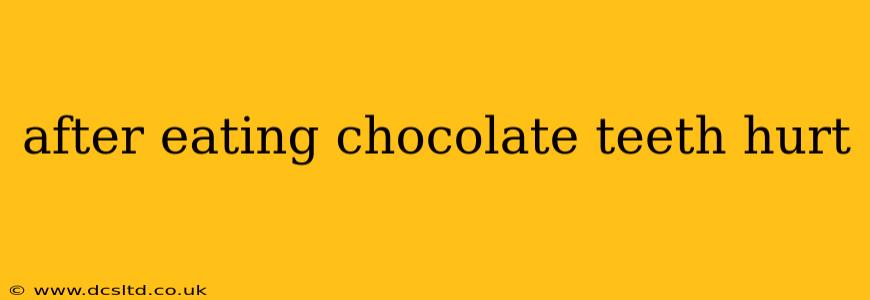Many people enjoy the delicious taste of chocolate, but sometimes, that sweet treat comes with an unwelcome side effect: tooth pain. This isn't just a minor inconvenience; it highlights a potential issue with your oral health. Let's delve into why chocolate can cause tooth pain and what you can do to prevent it.
Why Does Chocolate Cause Tooth Pain?
The primary culprit behind chocolate-induced tooth pain is its sugar content. Bacteria in your mouth feed on sugar, producing acids that erode tooth enamel, leading to sensitivity and pain. The more sugar the chocolate contains, the greater the risk. This is exacerbated by the sticky nature of many chocolates, which allows the sugar to linger on your teeth for longer periods, providing more time for bacteria to thrive.
Beyond sugar, the acidity of some chocolates can also contribute to tooth sensitivity. Darker chocolates tend to be more acidic than milk chocolate. Finally, some chocolate varieties might contain abrasive particles, which can scratch the enamel and increase sensitivity.
How Can I Reduce Tooth Pain After Eating Chocolate?
Fortunately, there are several strategies you can employ to minimize the impact of chocolate on your teeth:
1. Choose Dark Chocolate Wisely (Moderation is Key):
While dark chocolate often contains less sugar than milk chocolate, it's still important to consume it in moderation. The higher cocoa content can offer some antioxidant benefits, but the acidity remains a factor.
2. Rinse Your Mouth After Eating Chocolate:
This is one of the simplest and most effective methods. Rinsing with water helps wash away sugar and food particles from your teeth, reducing the time bacteria have to produce acid.
3. Chew Sugar-Free Gum:
Sugar-free gum stimulates saliva production. Saliva helps neutralize acids and wash away food particles, offering a natural defense against tooth decay. Look for gum containing xylitol, a sugar alcohol that can inhibit bacterial growth.
4. Maintain a Regular Oral Hygiene Routine:
This is crucial for overall oral health and preventing sensitivity. Brush your teeth twice a day with fluoride toothpaste, and floss daily to remove food particles trapped between your teeth. Consider using a mouthwash designed to help neutralize acids.
5. Visit Your Dentist Regularly:
Regular dental checkups and professional cleanings are essential for detecting and addressing potential problems early on. Your dentist can provide personalized advice based on your individual needs and risk factors.
What if My Tooth Pain Persists After Eating Chocolate?
If you experience persistent or severe tooth pain after eating chocolate, don't ignore it. This could indicate a more serious underlying issue such as:
- Cavities: These holes in your tooth enamel are caused by tooth decay and can be very painful.
- Gum Disease: Inflammation and infection of the gums can lead to sensitivity and pain.
- Cracked or Broken Tooth: A crack or fracture in your tooth can expose the nerve and cause intense pain.
Schedule an appointment with your dentist immediately if you experience persistent tooth pain, especially if it's accompanied by other symptoms such as swelling, bleeding gums, or fever.
Frequently Asked Questions (FAQs)
Is it okay to eat chocolate every day?
No, eating chocolate every day is not advisable for your dental health. The high sugar and sometimes acid content can increase your risk of cavities and tooth sensitivity. Moderation is key.
What type of chocolate is least damaging to teeth?
Generally, dark chocolate with a high cocoa content and lower sugar content is considered less damaging than milk chocolate or other sugary chocolate varieties. However, even dark chocolate should be consumed in moderation.
Can chocolate cause tooth decay in children?
Yes, children are particularly vulnerable to tooth decay caused by chocolate because their enamel is not fully developed. Monitoring their chocolate consumption and encouraging good oral hygiene habits are crucial.
This article is for informational purposes only and does not constitute medical advice. Always consult with a qualified healthcare professional for any health concerns or before making any decisions related to your health or treatment.
